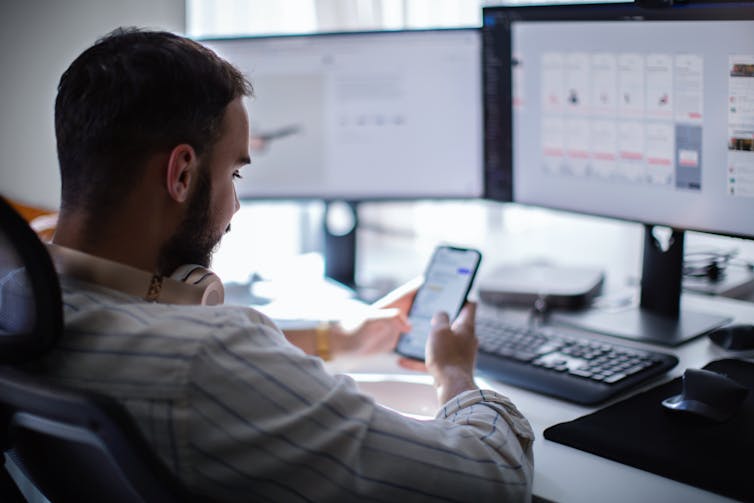Here’s how to maintain healthy smartphone habits

مجلة المذنب نت متابعات عالمية:
What is the first thing you do in the morning after you awaken? Many people immediately check their phones for notifications of messages, alerts and social media updates by their social ties.
Ninety-seven percent of U.S. adults report owning a cellphone, with 90% reporting that they own a smartphone.
While some researchers and media outlets portray phone use as detrimental, the reality is that the effects of technology use, including phones, vary depending on multiple factors. These include the amount, type, timing and purpose of that use. What is best for one group may not be best for another when thinking about technology use.
As a researcher who studies technology use and quality of life, I can offer some advice to hopefully help you thrive in a phone-saturated world. Some people may struggle with how to effectively use smartphones in their daily lives. And many people use their phones more than they think they do or more than they would like at times.
1. Monitor your use on a weekly basis
If the hours per day are increasing, think about why this is the case and whether this increased use is helping or hurting your everyday activities. An aspect of digital literacy is understanding your usage patterns.
2. Consider how you can use these devices to make your life easier
Using a smartphone can help people access online information, schedule appointments, obtain directions, communicate through a variety of mechanisms and potentially be in constant contact with their social ties.
This availability and access to information and social ties can be beneficial and help people juggle work and family responsibilities. However, it may also be related to work intensification, information overload, decreased well-being and the blurring of work/nonwork boundaries.
Weighing the pros and cons of use may help you understand when your phone use is beneficial versus detrimental.
3. Silence nonessential notifications and alerts
Do you really need to know that an old friend from high school messaged you on Facebook at that particular moment?
4. Select particular times during the day for social media
Be deliberate about when you allow yourself to use your phone for social media and other activities. Knowing these times each day may help you concentrate as well as help you to use your phone in more useful and productive ways.
Sergey Mironov/Moment via Getty Images
5. Avoid phone use at bedtime
Don’t look at your phone last thing before going to sleep or first thing when you awaken. Have you ever checked email one last time before going to sleep, only to find a message that gets your mind racing and ends up impeding your rest?
6. Choose when not to use your phone
Set times and situations when you are not going to use your phone.
Some of my research has shown that using your phone when in the presence of others who are not using devices, particularly older adults, can be perceived as rude, deter communication and induce distress. My colleagues and I termed this situation the physical-digital divide.
7. Find your own phone-use balance
Don’t compare yourself with others in terms of amount of use but be cognizant of when your use is beneficial versus perhaps leading you to feel stressed or distracted.
8. Moderate phone-as-distraction
Using your phone as a distraction is OK, but do it in moderation. If you find yourself constantly turning to your phone when you are bored or working on something that is hard, try to find ways to maintain your focus and overcome the challenges you are experiencing.

Aja Koska/E+ via Getty Images
9. Set boundaries
Let your immediate social ties know that you are not going to be checking your phone constantly. While people often expect immediate responses when they message others, the reality is that the majority of messages do not need an immediate response.
10. Be a savvy consumer of online information
This is not exclusive to phones, but it is relevant given the proportion of people who report using their mobile phones and other digital devices to access news and social media. In the era of mis- and disinformation, being critical of information found online is a necessity.
These suggestions can help you to be more cognizant of how much you are using your phone as well as the reasons you are using it. It’s important for your well-being to be a critical consumer of technology and the information you glean from using your devices, particularly your ever-present mobile phone.
نشكركم على قراءة المنشور عبر مجلة المذنب نت, المتخصصة في التداول والعملات الرقمية والمشفرة














